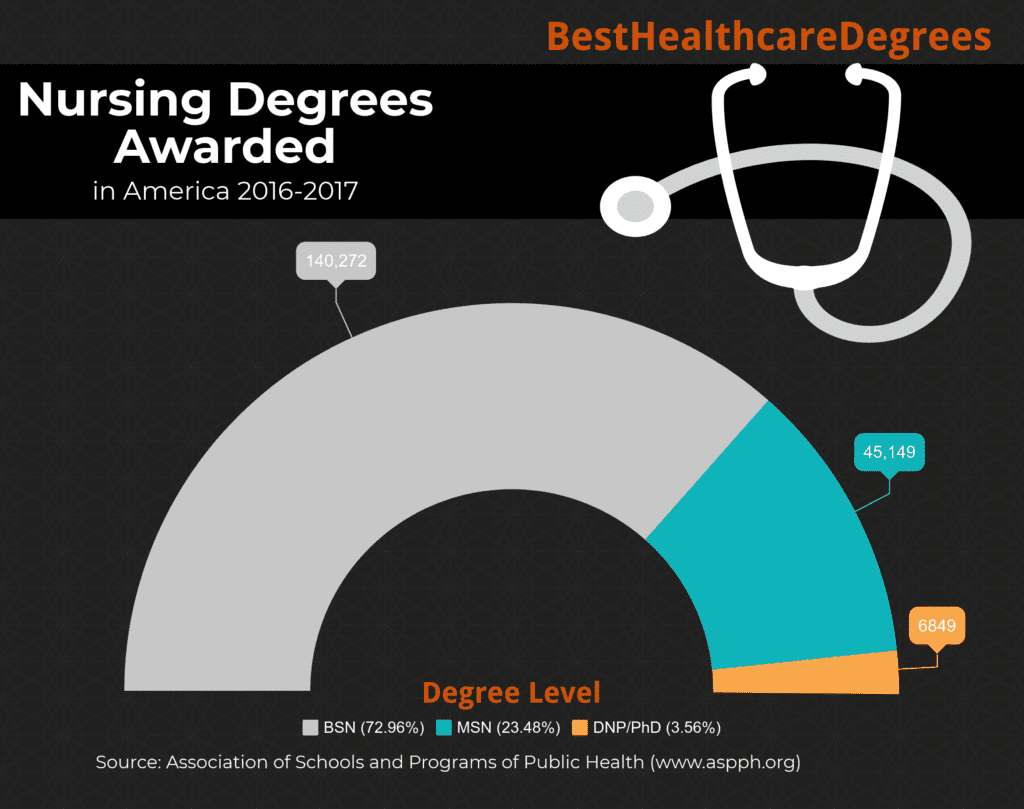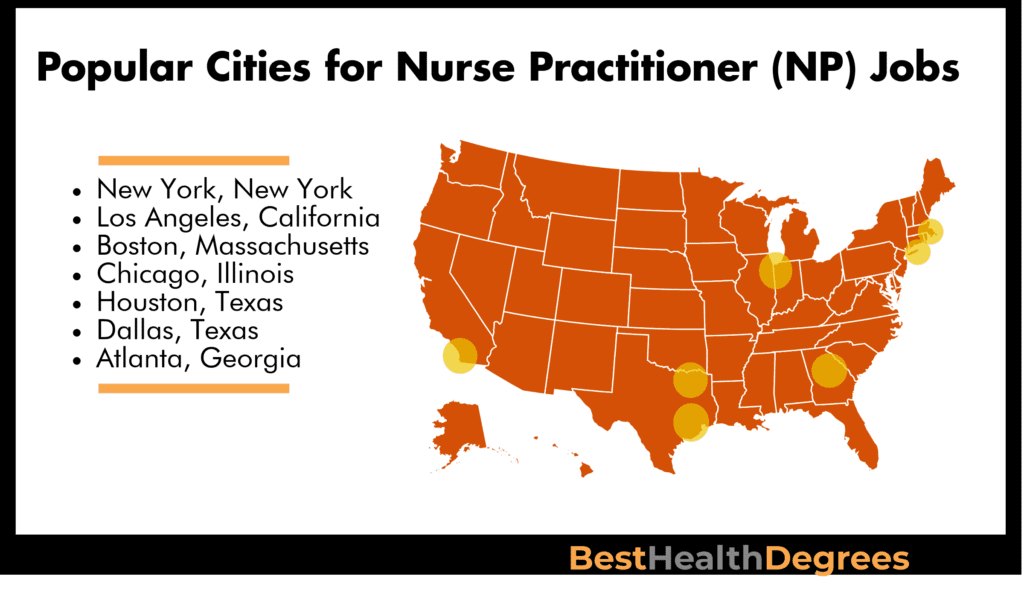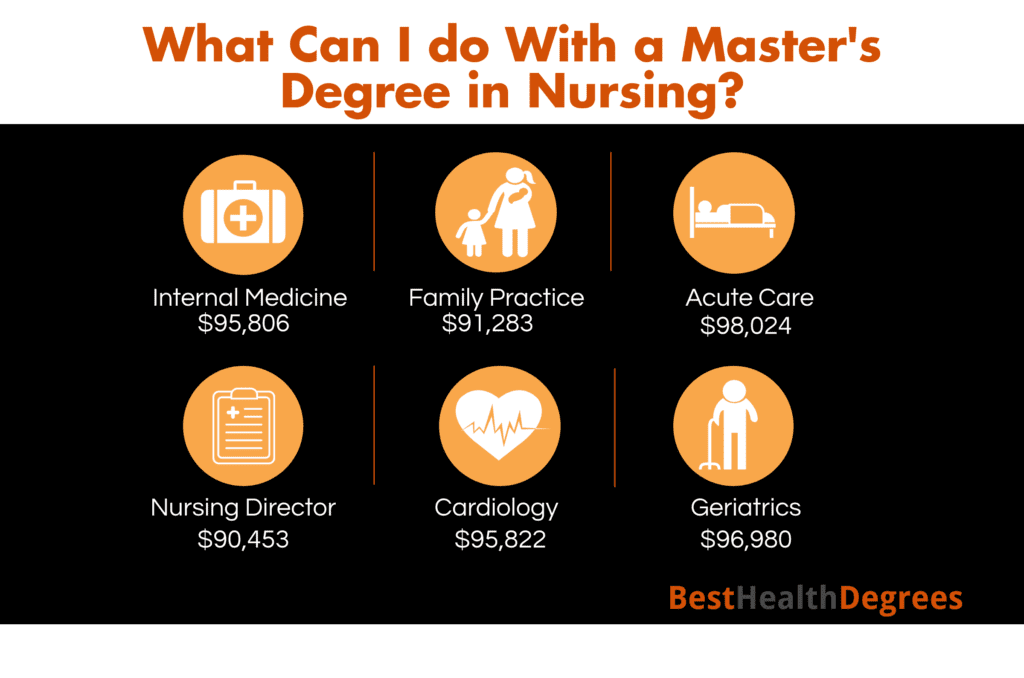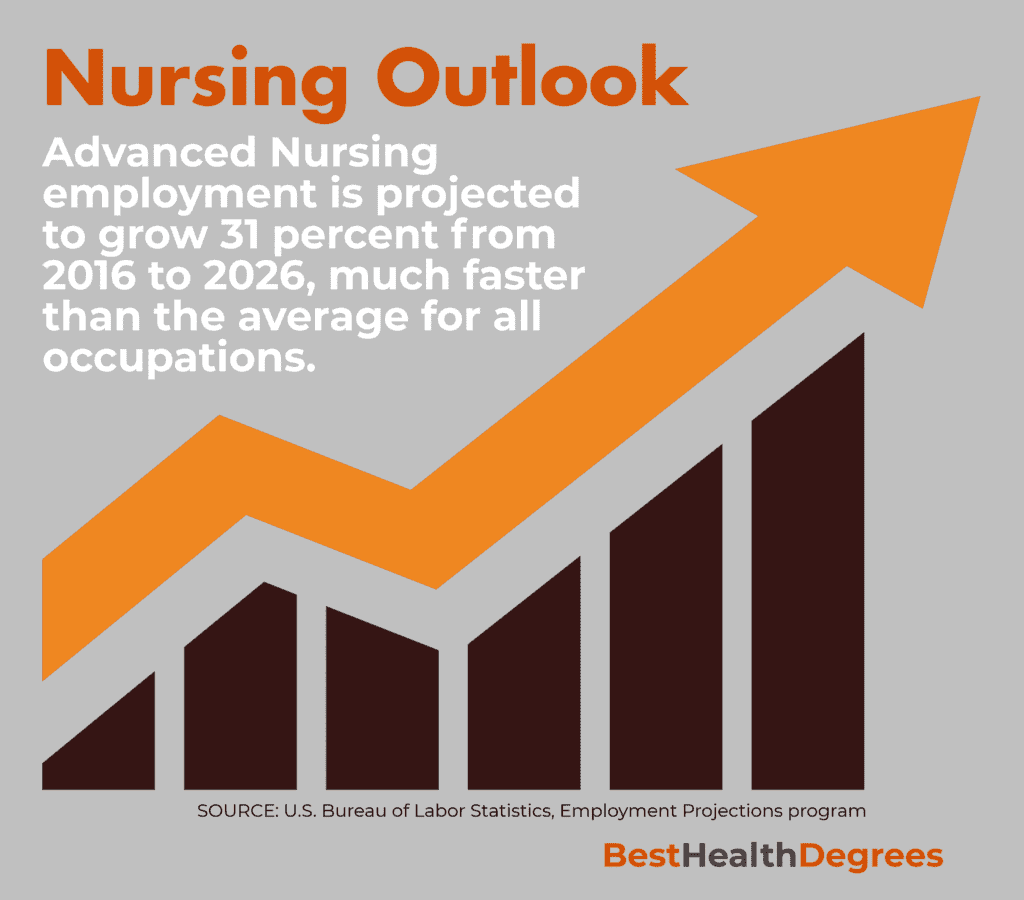Key Takeaways:
- A Master of Science in Nursing (MSN) opens doors to higher salaries and specialized roles like nurse anesthetist.
- With an MSN, nurses can become leaders, educators, or specialists in fields such as psychiatric or pediatric nursing.
- Accredited MSN programs meet high standards, ensuring quality education and better career opportunities.
- MSN degrees offer flexibility, respect from colleagues, and personal satisfaction from advancing in the nursing field.
Have you ever asked yourself — Should I get my master’s in nursing degree? Or, What can I do with a master’s in nursing? The answers to these questions can be found in understanding the many benefits of a master’s degree in nursing.
The Benefits of Master of Science in Nursing (MSN)
Earning a Master of Science in Nursing degree (most often referred to as an MSN degree) is an educational opportunity for nursing professionals who want to specialize, or to simply gain advanced nursing skills to open many doors to many specialties, and generally, higher salaries.

MSN degree candidates often choose to further their education to pursue a specific nursing career path, or nursing specialties, like education or nursing management. The benefits of a masters degree in nursing include the following:
Leadership Nursing Roles
Nursing professionals with advanced degrees often find rewarding job opportunities because they now possess the degree (and associated skills) required to manage nursing departments or lead teams of nurses within a nursing environment.
Specialty Nursing Roles
Many Masters of Science in Nursing degree programs are designed to educate nursing professionals for positions in nursing specialties that include an acute care nurse, psychiatric nurse, nurse-midwife, or even a family nurse practitioner, to name just a few. An MSN degree is the first step to moving towards one of the most well-respected (and high-paying positions) as a nurse anesthetist, which opens rewarding careers that pay more than $150,000 per year, according to Payscale.com.
Educator Nursing Roles
Many students who have asked themselves — What can I do with a masters in nursing?- Do so and realize they have the credentials to begin to be a nurse educator. Schools, hospitals and vocational settings employ nurse educators, to name a few.
Additional Respect from Colleagues and Other Medical-related Professionals
As with most advanced and post-baccalaureate degrees, the degree holders command additional respect from nurse colleagues, the nursing management staff and other medical professionals who they work alongside with. With this respect, comes job advancement, more complex medical conditions, and even a pay raise.
Additional Flexibility in Your Nursing Schedule
Nursing professionals who have earned a Master of Science in Nursing are generally senior members of a nursing department. This level of seniority often allows MSN holders to gain more convenient shifts and perhaps, additional time off.
Personal and Professional Fulfillment
Most students who attain advanced college degrees find great personal satisfaction in the accomplishment. This satisfaction often boosts self-confidence and self-esteem, which generally helps expand your working options and personal life decisions.
Nursing School Accreditation
Regional Accreditation: Regional accreditation is accomplished through the federal government’s seven United States Department of Education (USDE) Regional Agencies. These federal regional accreditation agencies are tasked with the responsibility of administering and managing the many accreditation agencies. Regional accreditation is thus, considered an exalted type of accreditation.
Specialized Accreditation: Undergraduate and graduate nursing degree programs often voluntarily opt to be evaluated so it is in a position to comply with the stringent accreditation standards.
Nursing School Accreditation: University and degree program accreditation is designed to assess, evaluate and finally make a determination if the school/program in question meets the accreditation organization’s industry-approved minimum standards. In general terms, nursing school accreditation is ‘stamp of approval’ that reveals to the nursing industry and future nursing students that the quality of the nursing program promised in the school’s brochure or found on the website is the education that is provided to students who wish to enroll.

There are several levels of nursing school accreditation employed in the United States’ nursing industry. Nursing school accreditation what to look for remains an important part of each student’s decision as to which nursing school would fit their needs best. The two primary nursing school accreditation agencies are the Accreditation Commission for Education in Nursing (ACEN) and the Commission on Collegiate Nursing Education (CCNE). As one would expect, a long-standing principled discussion continues regarding CCNE vs ACEN. Let’s see how the CCNE vs ACEN compares to one another.
The Commission on Collegiate Nursing Education (CCNE)
The United States’ Secretary of Education considers the Commission on Collegiate Nursing Education (CCNE) as a nationally accredited agency. CCNE’s primary purpose is to serve the public by ensuring nursing programs (who submit voluntarily) pass the CCNE accreditation standards set forth by industry experts and nursing leadership and authorities. In this way, the CCNE accreditation standards truly ensure a healthier outcome for the population it serves.
The Accreditation Commission for Education in Nursing (ACEN)
The Accreditation Commission for Education in Nursing (ACEN) operates under the United States Department of Education (USDE) as well as the Council for Higher Education Accreditation (CHEA). When it comes to comparing CCNE vs ACEN, ACEN holds the distinction as being the oldest accreditation specialist in the country.
One of the Accreditation Commission for Education in Nursing fundamental objectives to, of course, accredit nursing schools and all levels of nursing degrees, is to support the entire nursing industry by fortifying nursing education and the ways in which to best transition from a new graduate to a working nurse professional. If a nursing school proudly holds an accreditation from the Accreditation Commission for Education in Nursing, it speaks to how the program met the strict standards of ACEN’s accreditation process.
Types of MSN Degrees
There are many ways in which to earn your Master of Science in Nursing degree and many types of nursing degrees. The manner in which to you choose to earn your Master of Science in Nursing degree generally depends upon your current level of education. The MSN program requirements vary as each program is designed to meet the differing needs of nursing professionals. Therefore, the best MSN programs available on the market will depend upon your nursing experience and formal education.
RN to MSN Degree Programs
The Masters in Nursing requirements for an RN to MSN with bachelors in another field generally requires three years of study. This somewhat accelerated education path to reach a Master of Science in Nursing degree allows nurses to quickly advance to their career objectives. These types of master degree nursing programs are also known as second degree nursing programs without prerequisites. These second degree programs without prerequisites offer nursing professionals a viable way to advance their careers.
Many students mistakenly try to compare the RN vs MSN programs, because it is like comparing apples to oranges. Remember that when comparing the RN vs MSN you are comparing a graduate degree to a nursing license. An RN to MSN with bachelors in another field program appeals to nursing professionals who hold a two-year diploma in nursing but not a baccalaureate-level nursing degree. Also, it is noted that many RN to a Master of Science in Nursing programs are offered online which allows for greater flexibility and convenience for working learners.
BSN to MSN Programs
Master degree nursing programs, like the BSN to MSN programs, are available both on-campus and online. Online masters in nursing requirements are generally offered as accelerated BSN to MSN programs.
These accelerated BSN to MSN programs can generally be completed in two years of study. During a BSN-to-MSN program, nursing students will have specialized courses focusing on their career goals; they will go through a clinical experience; and they will prepare for the requirements of a specialized certification or license after graduation.
These BSN to masters in nursing programs appeal to nurses with a BSN who want to advance their career or complete specialized training to take on a nurse practitioner, nurse anesthetist, or another advanced practice position. The BSN to MSN programs are often appealing to programs appeal to nurses with a BSN who want to advance their career or complete specialized training to take on a nurse practitioner, nurse anesthetist, or another advanced practice position.
BSN to masters in nursing programs typically requires additional time to complete due to the prevalence of coursework required to appropriately prepare for specialty certifications.
ADN-to-MSN Programs
One of the best MSN programs available for nursing professionals who hold an Associates Degree in Nursing (ADN) can generally be completed in about two years. The masters in nursing requirements for this program depend upon whether you seek the available options as a nurse educator or a specialized nurse practitioner.
Online MSN Programs
Nursing professionals with full-time nursing responsibilities are on the move most of their shift. Besides, most nursing professionals have a busy family and personal lives. While many nursing professionals consider returning to school to earn their Masters of Science in Nursing, they generally find themselves incredibly overwhelmed.
However, with the incredible popularity (and accreditation) of online MSN programs, the potential to earn your master’s degree in nursing while holding down a full-time nursing position is now within reach. Nursing professionals are now in a position to attend the top RN to MSN online programs offered by some of the finest nursing schools across the country.
First, consider what is most important to you as a student studying from online MSN programs. Here is a list of important considerations. What is most important to you as a student?
- RN to MSN online programs
- The best online MSN programs
- The cheapest online MSN program
- Online BSN to MSN programs
- The top RN to MSN online programs
- The shortest MSN program
- A BSN to MSN online fast track
- RN to MSN online bridge programs
- 1 year online MSN programs
- The easiest online nurse practitioner program
Many of the best online MSN programs can be found in the varied 1 year online MSN programs; however, students must meet the RN to MSN online bridge programs application requirements to enroll.
RN to MSN online programs are often the cheapest online MSN programs as much of the coursework (not including clinical requirements) can be completed on a distance learning platform that offers students access to these online MSN programs.
The BSN to MSN online fast track options offers one of the shortest MSN program online. Some top universities across the country offer online BSN to MSN programs that are also the best online MSN programs and the easiest online nurse practitioner program.

Certifications/Licenses for Nursing Specialties
One of the primary reasons a nursing professional chooses to earn their graduate nursing degree is that there is significant growth in salary and responsibilities when holding one of the MSN degree options. The masters in nursing specialties vary but offer incredibly rewarding nursing options. Nursing Specialties and any required certifications reach pretty much every facet of the medical/nursing community. A partial list of types of master degree in nursing specialties include, in part:
- Adult-Gerontology
- Ambulatory Care
- Cardiac Vascular
- Family Nurse Certification
- Healthcare Disaster
- Informatics
- Medical-Surgical
- Mental Health
- Nursing Case Management
- Pain Management
- Pediatric Nursing
The types of MSN degrees one chooses should dovetail with your professional goals and objectives. If you are interested in working with babies or children, it is best to choose one of the types of master degree in nursing that offer professional credentialing in pediatric or neonatal care.
One of the most popular masters in nursing specialties is the mental health nursing specialties. The good news is that the varied MSN degree options and the many types of MSN degrees open rewarding career opportunity for those nursing professionals prepared to seize the day.
Masters in Nursing Jobs
Jobs for nurses with MSN degrees expand a nursing professional’s career opportunities, though of course location matters for healthcare jobs. Many career trajectories move quickly ahead with all the MSN degree job opportunities. The list that follows is just a brief sampling of the many and varied jobs for nurses with MSN degrees:
Nurse Practitioner: A Nurse practitioner is one of the masters in nursing jobs where a nurse provides care to all patients, independent of their age. They typically work under the direct supervision of a medical physician. A nurse practitioner must possess a masters in nursing and, a certification in one or more specialties.
Many nurse practitioners choose to specialize further by dedicating their professional careers to family care. Therefore, many MSN degree job opportunities are available working in physician’s offices providing preventative care or treating common disorders and illnesses. Nurse practitioners are also tasked with the responsibility of educating their patients and by promoting healthy lifestyle choices.
Nurse Midwife: A nurse-midwife is an MSN specialty for nurses who wish to care for women who are about to deliver their baby. This often includes prenatal care as well as postpartum treatments.
Nurse Educator: Many candidates for masters in nursing jobs choose to pursue careers as nurse educators; tasked with the responsibility of teaching and training current nursing staff members or nursing students. Work is generally available in institutions of higher education or other types of medical facilities.
Pediatrics Nurse Practitioner: A pediatrics nurse practitioner has dedicated their nursing career to working with children. They are often most needed for young patients who are fighting a chronic illness or life-threatening disease.
Psychiatric Nurse Practitioner: A psychiatric nurse practitioner holds an ARNP (Advanced Registered Nurse Practitioner) with a specialization in psychiatric nursing. Psychiatric nurse practitioners assess patients’ mental health, offer diagnosis, and will set a prescription for therapy, medications, or other treatment. They usually work under the supervision of a psychiatrist.
Nurse Anesthetist: A nurse anesthetist is quite a lucrative MSN nursing specialty. A nurse anesthetist is a highly trained graduate nursing professional as they are trained to administer anesthesia, manage the anesthetic process and manage the patient’s recovery from the administered anesthesia.
The majority of nurse anesthetists work in surgical centers or directly for hospitals. A nurse anesthetist carries a great deal of responsibility in his or her nursing duties, therefore, a nurse anesthetists must be licensed as an APRN (Advanced Practice Registered Nurse) and receive accreditation issues by the ANNA (the American Association of Nurse Anesthetists).
Acute Care Nurse Practitioner: An MSN nursing professional has the opportunity to work with patients who are critically or acutely ill. An Acute Care Nurse Practitioner works under the direct supervision of an attending physician and a nurse manager in the department. Acute Care Nurse Practitioners monitor a patient’s vitals; administer procedures under a doctor’s request. Acute care nurse practitioners are also responsible for much of the patient’s paperwork and informing the patient’s family and current conditions and progress.
Director Of Nursing: Many MSN graduates use their advanced degree to springboard their careers into the field of management and leadership. A director of nursing is charged with the oversight of a nursing unit, which includes establishing, and enforcing safety procedures, maintaining an organized, cohesive nursing staff, and professional guidance for nursing professionals who wish to further their careers.

The MSN Salary
One of the more important factors to consider as you think about earning a graduate degree in nursing is how the MS nurse salary differs from a salary that is earned from a lesser degree. A master of science in nursing salary is likely to be higher than a salary received by a nursing professional that only holds a Registered Nursing degree or even a Bachelor of Science in Nursing (BSN).
An MSN salary will vary from region to region, state to state, and even city to city. There are some medical facilities with MSN jobs that pay 50 and hour, still, others pay more, depending on the current supply and demand conditions.
MSN salary per hour is typically contingent upon the location, particularly the general cost of living. The higher the cost of living in a specific location, the higher the MSN salary per hour.
According to the federal government’s Bureau of Labor Statistics (BLS), a nursing professional with a graduate-level nursing degree (an MS nurse salary) earned on average for 2018 is $113,900, which exceeds, on average, MSN jobs that pay 50 and hour.
A Master of Science in nursing salary that lifts your current salary is not the only great reason to earn your MSN degree. According to the BLS, the projection of job growth for nursing professionals with a graduate degree is 31%, which is significantly stronger than the national average around 8%. Some of this growth can be attributed to the strong demand regarding preventative care and an aging baby-boomer population.
An MSN salary varies, as noted above, by state and the economic principle of supply and demand. However, an MSN salary per hour varies based on your nursing specialty. The five states, according to Nurse.org, that offers the highest MSN salary are as follows:
- Alaska — $111,000
- California — $110,000
- Oregon — $107,000
- Hawaii — $106,000
- Massachusetts — $105,000
Professional Organizations for Nurses
In many significant ways, professional organizations for nurses represent the backbone of the nursing industry. The nursing profession has more than one hundred nurse practitioner organizations (like the American Nurses Association) dedicated to helping nurse professionals in many ways, as follows:
- Connects specialty nurse members with others who practice their nurse specialty
- Creates continuing education opportunities through online course recommendations and workshops
- Encourages evidence-based nursing procedures
- Members can attend nurse practitioner organizations in annual events
- Offers an effective networking source
- Provides a united, collective voice for nursing professionals and the industry
The American Nurses Association: The American Nurses Association(along with the National League for Nursing) devotes most of the resources to broadly focus on the nursing profession as a whole. Many nursing industry experts agree that the American Nurses Association is one of the top 10 nursing organizations in the nation.
Many of the other top 10 nursing organizations tend to focus on specific diseases, health care environments, age-related care, or advanced nurse professionals.
If you have considered if there are any free nursing association memberships, the short answer is no. There are large, well-organized social organizations that sometimes appear to be one of the professional organizations for nurses, and they may offer free nursing association memberships, but the membership will be for something other than a traditional nursing professional organization. However, it is noted that most professional organizations for nurses offer discounts to new nursing school graduates.
Related Rankings:
25 Best Traditional MSN Degree Programs
15 Online MSN Degree Programs
10 Fastest Online MSN Degree Programs
10 Most Affordable Online MSN Degree Programs